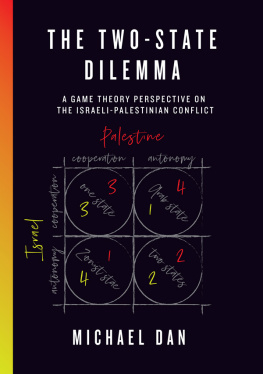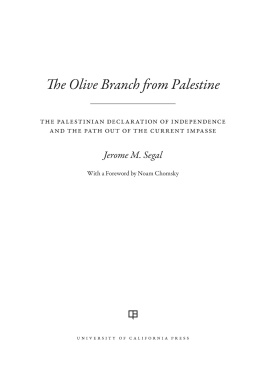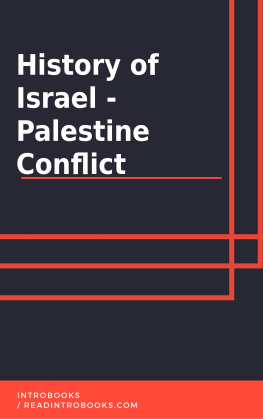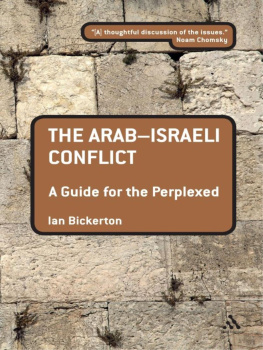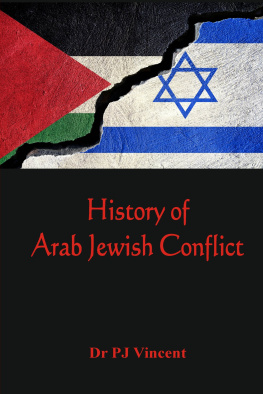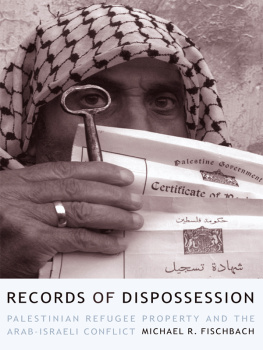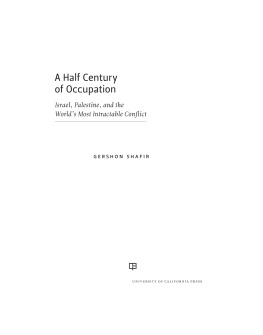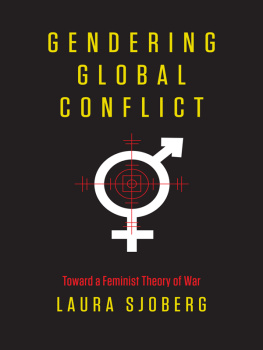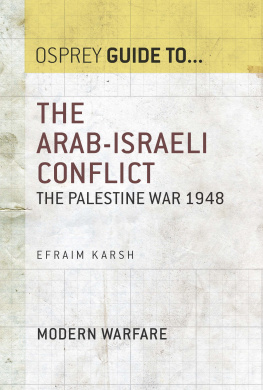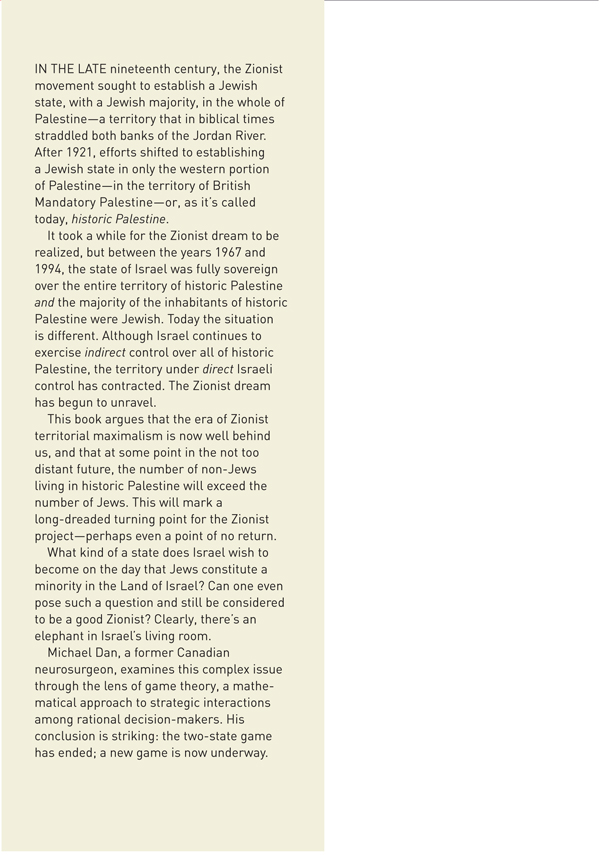
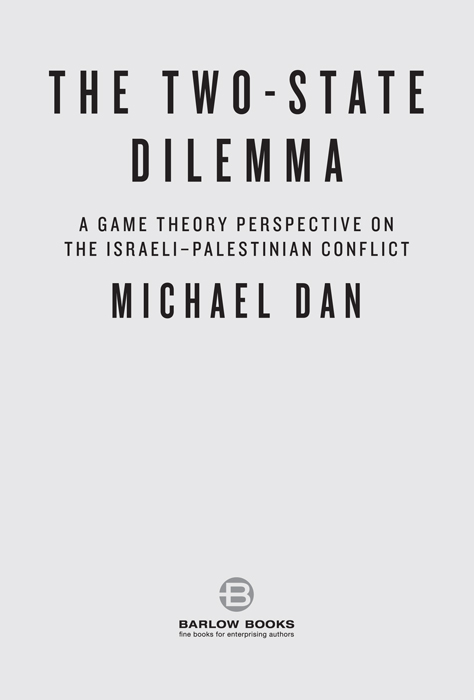
Copyright Michael Dan, 2020
All rights reserved. No part of this publication may be reproduced, stored in a retrieval system or transmitted, in any form or by any means, without prior written consent of the publisher.
Library and Archives Canada Cataloguing in Publication data available upon request.
ISBN 978-1-988025-45-2 (hardcover)
Printed in Canada
TO ORDER IN CANADA:
Georgetown Publications
34 Armstrong Avenue, Georgetown, ON L7G 4R9
Publisher: Sarah Scott
For more information, visit
www.barlowbooks.com

To Amira, with love and with gratitude
for your wisdom and support
But the Jews, once settled in their own State, would probably have no more enemies.
THEODOR HERZL, 1896
We and they want the same thing:
We both want Palestine. And that is the fundamental conflict.
DAVID BEN-GURION, 1936
Preface
A NEW GAME
The three-thousand year presence of the Jewish people in the Land of Israel (Eretz Yisrael in Hebrew) is beyond any doubt. The future existence of a Zionist state in Eretz Yisrael is far from certain, however.
In the late nineteenth century, the Zionist movement dreamed of establishing a sovereign Jewish state, with a Jewish majority, in the whole of Palestinea territory that in biblical times straddled both banks of the Jordan River. Jewish nationalists often refer to this territory as Eretz Yisrael HaShlema (the whole, or complete, Land of Israel). After 1921, however, efforts shifted to establishing a Jewish state in only the western portion of Eretz Yisrael HaShlemain the territory of British Mandatory Palestineor as its called today, historic Palestine (see figure P.1).
It took a while for the Zionist dream to be realized, but between 1967 and 1994, the state of Israel was fully sovereign over the entire territory of historic Palestine and the majority of the inhabitants of historic Palestine were Jewish. Today the situation is different. Although Israel continues to exercise indirect control over all of historic Palestine, the territory under direct Israeli control has gotten smaller and the demographic picture has become more precarious for the Jews. The Zionist dream has begun to unravel.
With the signing of the Oslo II Accord in 1995, the Palestinian Authority gained civilian control over a series of scattered enclaves in the West Bank (Areas A and B), as well as the Gaza Strip. This represents a form of partial sovereignty for the Palestinians. (See figure P.2.) Entry into Area A is now forbidden to Israeli civilians. Construction of Jewish settlements in Areas A and B is likewise precluded. The Israel Defense Forces (IDF), however, enter Areas A and B on a regular basis for purposes of conducting anti-terrorist raids (typically at night, and typically in coordination with the Palestinian Security Services). Following Hamass takeover of the Gaza Strip in 2007, any Israeli civilian caught visiting without the proper entry and exit permits may have their citizenship revoked.
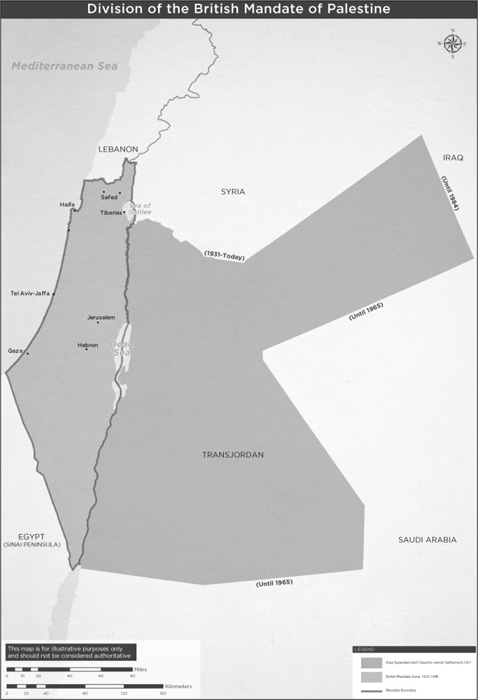
FIGURE P.1 | DIVISION OF THE BRITISH MANDATE FOR PALESTINE (1921) |
SOURCE: Israel Ministry of Foreign Affairs. https://mfa.gov.il/mfa/aboutisrael/maps/pages/the%20league%20of%20nations%20mandate%20for%20palestine%20-%201920.aspx. Public domain, Israel Ministry of Foreign Affairs.
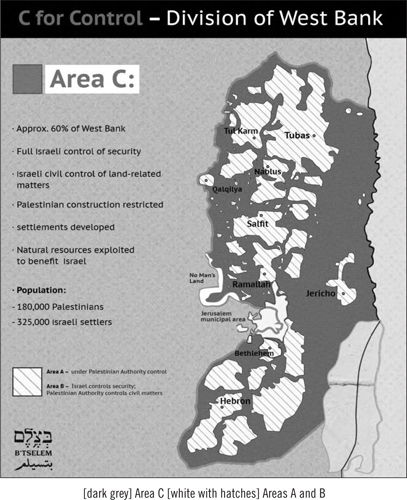
FIGURE P.2 | MAP OF DIVISION OF THE WEST BANK. AREA C IS UNDER FULL ISRAELI CONTROL, FOR BOTH CIVIL AND SECURITY MATTERS. AREAS A AND B ARE AREAS OF PARTIAL PALESTINIAN SOVEREIGNTY |
SOURCE: BTselem. https://www.palestineportal.org/learn-teach/israelpalestine-the-basics/maps/maps-1967-to-present/. Used with permission of BTselemThe Israeli Information Center for Human Rights in the Occupied Territories.
The era of Zionist territorial maximalism is now well behind us, and at some point in the not too distant future, the number of non-Jews living in historic Palestine will exceed the number of Jews. This will mark a long-dreaded turning point for the Zionist projectperhaps even a point of no return.
What kind of state does Israel wish to become on the day that Jews constitute a minority in Eretz Yisrael? Can one even pose such a question and still be considered a good Zionist? Clearly, theres an elephant in Zionisms living room.
For decades now, demographic forces in historic Palestine have been pulling the Jewish state towards two very different political horizons. In one direction lies a state of all its citizens (the majority of whom wont be Jewish), and in the other direction, an undemocratic, apartheid-like state dominated by Jewish ultranationalists. And neither of these are Zionist choicesat least not the kind of Zionism thats envisioned in Israels Declaration of Independence (which, if you read it carefully, embraces a two-state solution with economic union, and complete equality of social and political rights for all inhabitants).
Under the Westphalian system of government (which forms the basis for the modern international system), a sovereign state should have well-defined borders, a permanent population, a single government, and the capacity to enter into normal relations with other sovereign states. And above all else, a sovereign state should not interfere in the affairs of other sovereign states. Such a system was imposed on the defeated Ottoman Empire at the conclusion of the First World War; for a variety of reasons, it never really caught on.
Neither the state of Israel nor the state of Palestine conforms well to the Westphalian model. If we accept for a moment that Palestine is already a de facto state in international law (which isnt a particularly controversial position to take), then its abundantly clear that the state of Israel is constantly interfering in the affairs of the state of Palestine (allegedly for security reasons). The state of Israel has no international border with the state of Palestine (or Syria or Lebanon for that matter). And the state of Palestine, for its part, no longer has a single government.
None of these details seems to matter very much to most Israelis. But to a generation of Palestinians raised on the dream of full sovereignty over just 22 per cent of their historic homeland (the maximum area now claimed by the state of Palestine), theres nothing left but the misery of colonization.
The two-state game has ended; a new game is now underway.
Introduction
WHY NOW?
Like two lost travellers wandering through the desert, Israel and the Palestinian Authority have spent more than a quarter century chasing a mirage called the two-state solution. But instead of two states for two peoples between the river and the sea, theres at best perhaps one and a half. And instead of peace, theres the most intractable conflict in modern history: the Israeli-Palestinian conflict. Why is it that Israel and Egypt, Israel and Jordan, or even the Irish and the British were able to patch things up and accomplish the previously unthinkable, but not Israel and Palestine? Is the so-called peace process for real, or only a game? And if its a game, then is it a game that can even be won?

